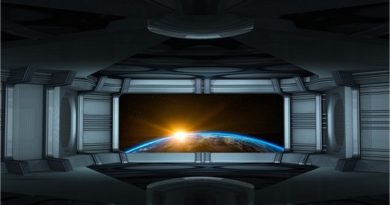City of Icons
The court is a five-foot-by-five-foot cell designed as a decompression chamber, but it had been turned into an ad hoc prison after one of the first wakers had an “episode” and nearly exploded the arc. After this, they installed the psychological alerts, and all stress reports were made immediately public so all the wakers know who is beyond measure, as we wakers say.
The court had no star windows, no cloudy double-layered polyurethane and glass bleeding the night in. A single disk-shaped glow of vanilla overhead. Unrelenting ship-gray walls and plastic ergonomic benches for sleeping and sitting. Meals were filtered in through the means of a triple-latched electronic “dumb” waiter.
I saw Stanislaus’ position clearly, and he was right to think that my protestations to the contrary should not be entertained. But still I hated the court’s walls. I detested his ardor for order that would create nothing, or that would create only denial, an absence. But my remonstrations and anger were becoming reckless ― I could feel a slight tremble and wattage in my heart, an explosiveness. I quickly swallowed two Miltowns and lay back, silent, letting the electric lights glide me to sleep.
⊕
The worst of that time was that I could not visit Pod32a, my Isabella. Father came sadly, held my head in his lap. Then softly, like a dream, he disappeared, leaving me nothing but a lonely coronary thumping, the incessant hiss of air.
Lorenz served me then, a young girl of fifteen or sixteen. She served meals through the electronic waiter and occasionally, she would whisper questions.
“Are you Noah? What did you do? They say you killed your father, is it true?”
“It is not true,” I whispered back, “Not true. I was a fool, but not a murderer.”
“How did it happen?”
“I didn’t see the O/2 meter in time.”
“They say you’re dangerous.”
“Maybe.”
“Why?”
“I do not pay attention to things the way I should. I’m incessantly on the verge of distraction.”
“You are in love with an icon, aren’t you?”
“What?”
“This is what they say. Marcus says you love an icon, an ice-cold icon, is that true?”
“Why would I fall in love with a frozen icon? That’s ridiculous. Icons are dead. They’re not for here, they’re for the future.”
“Is it true?”
I sighed. “I liked the manner in which an icon appeared.”
Lorenz yelped. “It’s Isabella, isn’t it? That’s what Marcus says. He says he’s seen you even kissing the glass.”
This was true. I have pressed my lips, my full body against the glass, searching for a way to be closer to my love. But I could not use that word, an old Earth word full of the sin, nor admit the passion. I denied it all:
“This is a disgusting piece of conversation, Lorenz. I would never do that. Marcus is lying because I told him I had seen an Earth video of his father’s father lashed to a bomb.”
Lorenz giggled then said, “It is permissible, Noah. I do not care. I appreciate the view of them too. Were they not the most perfect people on Earth when we left? Why should we not like the way they look?”
“Exactly. I think it nearly standard ― a sense of team building in terms of common humanity ― we are all one, after all, in the dead and frozen…Do you think Isabella is lonesome?”
I should not have asked, of course. There was a long pause. Finally Lorenz came back:
“She’s an icon, Noah. You know how she is.”
⊕
Days, maybe weeks before I was finally freed, I felt the ship lowering, could sense the jagged entry and knew Stanislaus had brought her down, was going to world stop, after all.
I asked Lorenz, and she said that she could say nothing because she was under orders not to say anything that might make me excitable.
“What would make me excitable?”
“If I told you, you might get excited.”
“Lorenz.”
But she was gone.
Click below to continue reading


